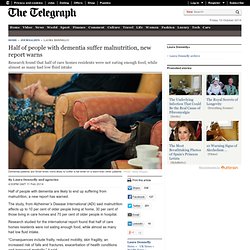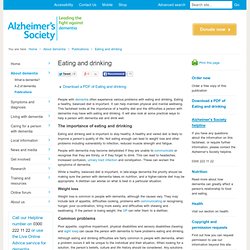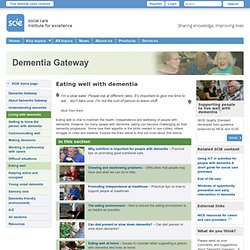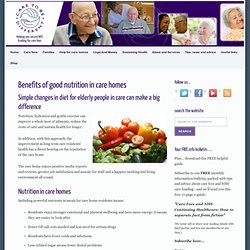

Www.alz.co.uk/sites/default/files/pdfs/nutrition-and-dementia.pdf. Page. Nutricia Advanced Medical Nutrition UK - uk.nutricia.com. Elior - Because the Whole Experience Matters. Nutricia Advanced Medical Nutrition UK - uk.nutricia.com. Www.cwt.org.uk/pdfs/OlderPeople.pdf. Hungry to be Heard viral video: Part 1. Still_hungry_to_be_heard_report.pdf. Hungrytobeheard.pdf. Half of people with dementia suffer malnutrition, new report warns. Some 800,000 people in the UK have a form of dementia, and more than half have Alzheimer’s disease.

Around 1.7 million people will have dementia by 2051. Three French studies have shown that, in people with mild to moderate Alzheimer’s disease, clinically significant weight loss was observed in around 45 per cent of patients, the report says. Meanwhile, research in the US found that half of those in care homes were not getting enough food or drink. Experts in the UK said they suspect similar trends in this country. George McNamara, head of policy at the Alzheimer’s Society, said: “It is scandalous that hundreds of thousands of people living with dementia in the UK have been let down when it comes to something as basic as food and drink. “It is vital to get the fundamentals of care right, and we need a wake-up call across our health and social care system. “Malnutrition can be avoided by healthcare professionals doing simple things such as monitoring weight and nutrition.” Eating and drinking. Download a PDF of Eating and drinking People with dementia often experience various problems with eating and drinking.

Eating a healthy, balanced diet is important. It can help maintain physical and mental wellbeing. This factsheet looks at the importance of a healthy diet and the difficulties a person with dementia may have with eating and drinking. It will also look at some practical ways to help a person with dementia eat and drink well. The importance of eating and drinking Eating and drinking well is important to stay healthy. People with dementia may become dehydrated if they are unable to communicate or recognise that they are thirsty, or if they forget to drink.
While a healthy, balanced diet is important, in late-stage dementia the priority should be making sure the person with dementia takes on nutrition, and a higher-calorie diet may be appropriate. Weight loss. Www.careinfo.org/wp-content/uploads/2013/02/Iddon-Mike.pdf. Dementia Services Development Centre l DSDC, Stirling.
Prof June Andrews was reminiscing about a visit to a care home where she looked at the lunch menus and asked, “Is there a vegetarian option?”

“Oh, well, actually, we have that at supper time” was the nonchalant reply. When she told us this, we were laughing, but we weren’t happy. This is where we became interested in “Vegetarian for Life”, and we are delighted to host this blog from Tina Fox. Vegetarian for Life “Vegetarian for Life” was established as a charity in 2007 – and it is a service that offers advice for older vegetarians and vegans and those who care for them. I know from talking to people at the various care roadshows and other events that we attend that this is quite a common approach.
Our research has shown that at least one in four care homes houses one or more vegetarians and they often cluster together. The fact is that someone who has never eaten meat/ fish or has not eaten them for over 50 years is going to find this “new” food a shock to the system. . – Tina Fox. Vegetarian for Life. Eating well with dementia – SCIE Dementia Gateway. I’m a slow eater.

People eat at different rates. It’s important to give me time to eat... don’t take over. I’m not the sort of person to leave stuff.Mick from Kent Eating well is vital to maintain the health, independence and wellbeing of people with dementia. Challenge Care Homes. 003284.pdf. Good nutrition can replace costly supplements in care homes. The Food First project has been tackling malnutrition by encouraging good food rather than dietary supplements, offering a better service for residents into the bargain.

Paul Dinsdale explains Most of the UK population can afford to eat healthily, but a growing number of people are at risk of a condition which many of us still associate with the Victorian era and the depression-hit 1930s. According to recent figures, around one million people a day living at home in the UK are currently estimated to be suffering from malnutrition, and these figures do not include those in residential or nursing care. In recent years, the NHS has addressed the growing problem of malnutrition among hospital patients, where trusts have control over the dietary content of food served to patients. However, in the community setting, this has proved to be a more difficult problem to tackle, as many residential care homes are run by independent providers. Addressing the real issue Checking food standards. Olderresident.pdf. Benefits of good Elderly Nutrition in Care Homes. Simple changes in diet for elderly people in care can make a big difference Nutrition, hydration and gentle exercise can improve a whole host of ailments, reduce the costs of care and sustain health for longer.

In addition, with this approach, the improvement in long term care residents’ health has a direct bearing on the reputation of the care home. The care home enjoys positive media reports and reviews, greater job satisfaction and morale for staff and a happier working and living environment all round. Nutrition in care homes Including powerful nutrients in meals for care home residents means: Residents enjoy stronger emotional and physical wellbeing and have more energy; it means they are easier to look afterFewer GP call-outs needed and less need for certain drugsResidents have fewer colds and infectionsLess refined sugar means fewer dental problemsCare needs are less intense and require less staff time However… GPs generally have little, if any, training in nutrition.
Dignity and nutrition for older people. Prevention_Early_Intervention_Of_Malnutrition_in_Later_Life_Care_Home.pdf. Www.dignityincare.org.uk/_library/Resources/Dignity/CSIPComment/promotingnutritionincare_homes1.pdf.